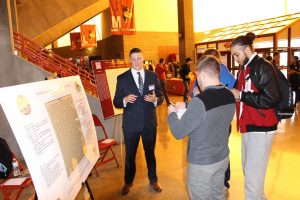DIFM’s Maria Boerngen was recently featured in CSA News Magazine for her study focused on farmer perspectives on nutrient loss strategies:
Maria Boerngen, an Assistant Professor of Agribusiness at Illinois State University, is interested in understanding how farmers access information and how they use that information in decision-making. In Agricultural & Environmental Letters (https://doi.org/10.2134/ael2019.02.0004), Boerngen and co-author Benjamin Marks recently published results of a study focused on farmer perspectives on nutrient loss strategies in one Illinois county. This pilot project was in preparation for a larger survey, but the approach is relevant for understanding how farmers discover information in general. For example, how do farmers learn about new crop varieties or new equipment? Or, what makes an individual farmer decide to implement a new management practice?
This specific pilot study consisted of a telephone survey of 30 farmers, conducted in 2016–2017. The researchers wanted to determine if farmers were familiar with the Illinois Nutrient Loss Reduction Strategy, if farmers were concerned with nutrient loss, and if farmers were taking action to reduce N and P runoff. Released in 2015, the Illinois Nutrient Loss Reduction Strategy was developed by a group of researchers and other stakeholders. The document outlines goals for reducing nutrient loss from agricultural land, industry, and urban landscapes. In addition to setting these statewide reduction goals for reducing N and P loss to the Mississippi River, the strategy includes suggested best management practices.
The results of these interviews revealed farmers are concerned about nutrient loss, even if they are not aware of the particular details of the state plan. Of the 30 farmers interviewed, 14 indicated they were familiar with the Nutrient Loss Reduction Strategy. Boerngen says it was encouraging to find out that 19 of the 30 said that they were concerned about nutrient loss and had taken steps to reduce the nutrient loss from their farms. These farmers also stated in interviews that their trusted sources of knowledge included researchers and retailers, suggesting that opportunities for researchers to communicate with farmers through field events can resonate with this group.
Click here to view the full article on CSA News Magazine.


